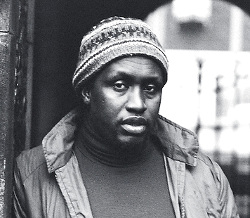




|
Ngũgĩ
wa Thiong'o
 Kenyan leftist novelist who
grew up during the time of the Mau Mau anti-colonial revolt.
In the 70's organized several popular plays: using normal
people as actors/actresses, the plays had strong messages of
anti-imperialism and social justice. Arrested in 1977 for his
opposition to the dictatorship of Daniel arap Moi. During his
time in prison he decided not to write anymore in English.
Subsequently he wrote only in his native language Gikuyu.
After his release in 1978 he left the country and has spent
the rest of his life in exile. Once a member of a small,
underground Marxist group in Kenya, he has transformed with
the years into a mild leftist.
Novels A Grain of Wheat (1967): 277 pages. This novel takes place after the end of the Mau Mau struggle. The book follows certain people and shows how they were affected by the "state of emergency" that the british colonialists declared during the Mau Mau struggle. It shows how the colonialists systematically disrupted Kenyan society: they destroyed villages and relocated the inhabitants to easily controlled, guarded, areas; they rounded up people randomly and imprisoned them in massive concentration camps that were built during the emergency; they brutally tortured the prisoners in the concentration camps to force them to give information or to renounce the Mau Mau oath; they forced villagers into performing slave labor for the army; they carried out land grabbing from peasants, etc... Petals of Blood (1977): 408 pages Devil on the Cross (1980): 250 pages Matigari (1987): 175 pages Plays The Trial of Dedan Kimathi (1976): 92 pages. Written jointly with Micere Githae Mugo, this play is a theatrical portrayal of the trial of Dedan Kimathi (famed leader of the armed insurrection against British imperialism). However it is also a depiction of the masses of Kenyan workers and peasants who fought for true independence from British colonialism. I Will Marry When I Want (1977): 117 pages. Written after the "flag independence" (Nkrumah's term) from Britain. The play is an attack against neo-colonialism in Kenya and the upper class and ruling class sycophants who are more than happy to be tools of imperialism in the economic rape and exploitation of "independent" Kenya. Ngugi also makes use of the legacy and tradition of the Mau Mau to criticize the contemporary situation (of neo-colonialism and capitalist plunder) in Kenya. Short Stories A Meeting in the Dark A Mercedes Funeral Gone with the Drought: Story that deals with the immense suffering that occurs during droughts, and generally because of poverty and hunger. Also attacks the "popular" use of words like "crazy" to describe people who have suffered greatly and act strange as a result. Minutes of Glory The Black Bird: Using "magic realism," Ngugi attacks those who aim to desecrate and humiliate their own traditions and heritage, with the goal of all the better enslaving themselves to the backward traditions of other peoples. The Mubenzi Tribesman: A brutal attack on the Kenyan nouveau riche that emerged after independence and it's complete lack of principles and disdain for the poor and obsession with consumerism and accumulation of wealth. Wedding at the Cross |